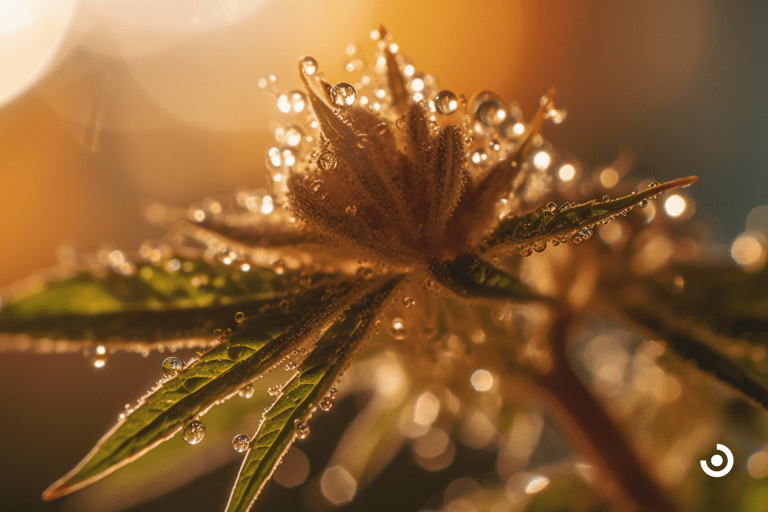Is Medical Marijuana An Appetite Stimulant For Elderly People?
by Haley Mills · October 26, 2023
Unlock the Secret: How Medical Marijuana Boosts Appetite in Elderly – Enhance Your Loved Ones’ Quality of Life Today!

Medical marijuana has gained increasing attention and acceptance as a potential treatment option for various medical conditions. One area of interest is its potential as an appetite stimulant for elderly individuals.
With age, many older adults experience a loss of appetite, leading to malnutrition and other health complications. This article aims to explore the question of whether medical marijuana can effectively stimulate the appetite in elderly people, providing an objective and evidence-based analysis of the topic.
Understanding the effects of medical marijuana on appetite is crucial to determine its suitability for elderly individuals. Numerous studies have suggested that certain compounds in marijuana, such as THC (tetrahydrocannabinol), may have appetite-stimulating properties. THC interacts with the body’s endocannabinoid system, which regulates appetite and food intake.
With this in mind, further exploration of the role of medical marijuana in combating age-related appetite loss is crucial to provide a comprehensive understanding of its potential benefits for elderly individuals.
Key Takeaways
- THC in medical marijuana interacts with the endocannabinoid system to increase hunger and enhance taste and smell.
- Medical marijuana offers a natural and potentially effective solution for age-related loss of appetite in elderly individuals.
- While there are potential risks and legal considerations, alternative options such as nutrient-dense foods and appetite stimulant medications should also be considered.
- Further research is needed to understand better the benefits and risks of using medical marijuana as an appetite stimulant for the elderly.
The Potential Benefits of Medical Marijuana for Elderly Individuals
Medical marijuana has shown potential as an appetite stimulant for elderly individuals, offering a natural and potentially effective solution to combatting age-related loss of appetite. Studies have suggested that the cannabinoids found in medical marijuana can activate receptors in the brain that regulate hunger and satiety, increasing appetite. This can be particularly beneficial for elderly individuals struggling with maintaining a healthy weight and getting proper nutrition.
Consider the potential risks of medical marijuana use in elderly individuals. While medical marijuana is generally considered safe, there are some potential side effects that should be taken into account. These can include dizziness, confusion, and impaired memory, which may be more pronounced in older adults. It’s crucial for healthcare providers to carefully assess the individual’s overall health and medication regimen before recommending medical marijuana as an appetite stimulant.
Additionally, legal considerations should be considered for elderly individuals using medical marijuana. The legality of medical marijuana varies from state to state, and individuals must understand the laws and regulations in their specific location. Some states have strict regulations regarding the use of medical marijuana, including age restrictions and qualifying medical conditions. Elderly individuals need to consult with their healthcare provider and familiarize themselves with the legal requirements before considering medical marijuana as an appetite stimulant.
Understanding the Effects of Medical Marijuana on Appetite
With a single inhale, a world of delightful flavors dances on the taste buds of seasoned individuals. Medical marijuana has long been known for its potential to stimulate appetite, especially in those experiencing a loss of appetite due to medical conditions or treatments.
While medical marijuana may be effective in stimulating appetite for some elderly individuals, there are alternative options that can be considered. One option is to focus on nutrient-dense foods that are high in calories and protein. This can help to increase calorie intake and promote weight gain. Additionally, incorporating small, frequent meals throughout the day can help to stimulate appetite and prevent feelings of fullness.
Another option is to explore the use of appetite stimulant medications, which a healthcare professional can prescribe. These medications work by increasing hunger and can be a safer alternative for elderly individuals who may have concerns about using medical marijuana.
Exploring the Role of Medical Marijuana in Combating Age-Related Appetite Loss
As individuals age, they may experience a decrease in appetite, which can lead to a range of health issues. However, medical marijuana has shown promise as an appetite stimulant for elderly people.
Here are three reasons why exploring the role of medical marijuana in combating age-related appetite loss may be beneficial:
- Alternative treatments for age-related appetite loss: Traditional pharmaceutical options may come with unwanted side effects or interactions with other medications. Medical marijuana offers a natural alternative that can potentially stimulate appetite without the same risks. This can be particularly important for elderly individuals who may already be taking multiple medications.
- Exploring non-pharmaceutical options for elderly individuals with decreased appetite: Medical marijuana provides a non-pharmaceutical option for elderly individuals who are experiencing a loss of appetite. This can be especially important for those who prefer to avoid pharmaceutical interventions or haven’t found success with other treatments. By exploring medical marijuana as an appetite stimulant, elderly individuals may have access to a safe and effective option for increasing their appetite.
- Evidence-based benefits of medical marijuana for appetite stimulation: Research has shown that medical marijuana can effectively stimulate appetite in various patient populations, including elderly individuals. The cannabinoids found in medical marijuana interact with the body’s endocannabinoid system, which plays a role in regulating appetite. This evidence suggests that medical marijuana may be a viable option for combating age-related appetite loss and improving overall health and well-being in elderly individuals.
The Science Behind the Appetite-Stimulating Properties of Medical Marijuana
The science behind the appetite-stimulating properties of cannabis is well-documented and widely recognized. Clinical studies have shown that medical marijuana can effectively stimulate appetite in elderly individuals experiencing age-related appetite loss.
One of the main mechanisms of action is the activation of cannabinoid receptors in the brain. In a study published in the Journal of Clinical Investigation, researchers found that THC, the main psychoactive compound in cannabis, activates the CB1 receptors in the brain, which regulate appetite. This activation leads to an increase in the release of appetite-stimulating hormones, such as ghrelin, and a decrease in the release of appetite-suppressing hormones, such as leptin. This dual effect helps to enhance the appetite and promote food intake in elderly individuals.
Another important mechanism of action is the modulation of the endocannabinoid system. The endocannabinoid system regulates various physiological processes, including appetite and metabolism. Medical marijuana contains cannabinoids that can mimic the effects of the body’s natural endocannabinoids, thereby influencing appetite regulation. By targeting the endocannabinoid system, medical marijuana can help restore the balance and stimulate appetite in elderly individuals.
Considerations and Precautions for Elderly Individuals Using Medical Marijuana
Here are some considerations and precautions to take into account:
- Possible interactions with other medications: Elderly individuals must consult with their healthcare provider before using medical marijuana, especially if they’re already taking other medications. Medical marijuana may interact with certain medications, potentially causing adverse effects or reducing the effectiveness of the prescribed drugs.
- Start with low doses: Elderly individuals should start with low doses of medical marijuana to assess their tolerance and response. This is particularly important for those new to cannabis or haven’t used it for a long time. Starting with a low dose allows for the dosage adjustment to achieve the desired effects without experiencing any unwanted side effects.
- Monitor side effects: It’s essential to closely monitor any side effects that may occur when using medical marijuana. Common side effects may include dizziness, dry mouth, increased heart rate, and impaired coordination. Elderly individuals should be aware of these potential side effects and report them to their healthcare provider if they occur.
- Seek guidance from a healthcare professional: Elderly individuals should seek guidance from a healthcare professional who’s knowledgeable about medical marijuana. They can provide personalized advice, monitor the individual’s response to treatment, and help ensure safe and responsible use of medical marijuana.
Frequently Asked Questions
What are the potential side effects of medical marijuana for elderly individuals?
Potential risks of medical marijuana for elderly individuals include cognitive impairment, memory problems, and confusion. Research suggests that long-term use may increase the risk of developing mental health issues such as anxiety and psychosis.
How does medical marijuana interact with other medications commonly used by the elderly?
Drug interactions and safety concerns are important considerations when using medical marijuana alongside other medications commonly used by the elderly. It is crucial to consult with a healthcare professional to ensure the safe and effective use of these substances.
Are there any specific strains or types of medical marijuana that are more effective as appetite stimulants for the elderly?
Dosage recommendations for elderly individuals using medical marijuana as an appetite stimulant can vary depending on the strain and individual needs. It is important for medical professionals to assist elderly patients in incorporating medical marijuana into their treatment plan for appetite stimulation.
Can medical marijuana be used as a long-term solution for age-related appetite loss?
Medical marijuana can potentially provide a long-term solution for age-related appetite loss in elderly individuals. In addition to nutritional supplements and cognitive behavioral therapy, it may be worth considering medical marijuana as an alternative treatment option.
Are there any alternative appetite-stimulating treatments or therapies for elderly individuals that should be considered before trying medical marijuana?
Before trying medical marijuana, alternative appetite-stimulating treatments for elderly individuals should be considered. Nutritional counseling can help address dietary issues, while acupuncture therapy has shown promise in stimulating appetite through its effects on the nervous system.
Last Updated: August 8, 2024
Get Approved for Your Medical Marijuana Card in Minutes!

Get Your Medical Card
Connect with a licensed physician online in minutes

Like This Article?
Share with your friends
Table of Contents
Keep Reading
-
Unveiling The Benefits Of Cannabis Microdosing
Uncover the Surprising Benefits of Cannabis Microdosing Today. Enhance Your Well-Being and Experience a Transformation. Click Now to Unveil the Secrets!
-
Top 5 Bud And Breakfast Locations In The US
Looking for a ganja-friendly getaway? Check out the top 5 bud and breakfast locations in the US! Unwind, relax, and indulge in ultimate stoner bliss. Book now and elevate your vacation experience!
-
A Comprehensive Guide To Understanding Medical Marijuana
Unlock the healing potential of medical marijuana with this comprehensive guide. Understand its benefits and start exploring today for a better understanding of cannabis-based medicine. Don’t miss out, click now!



